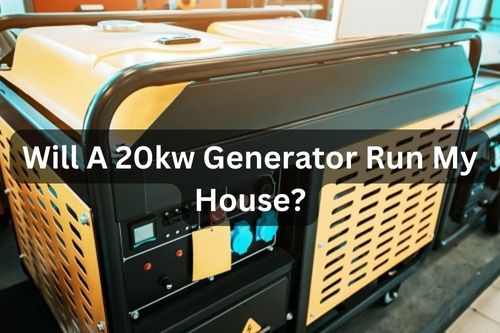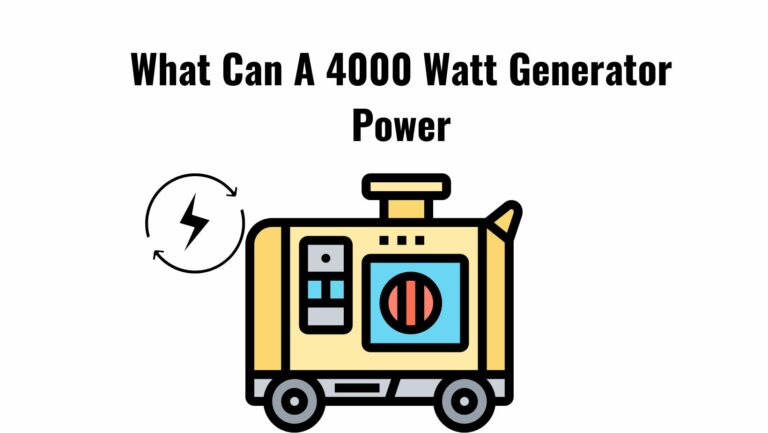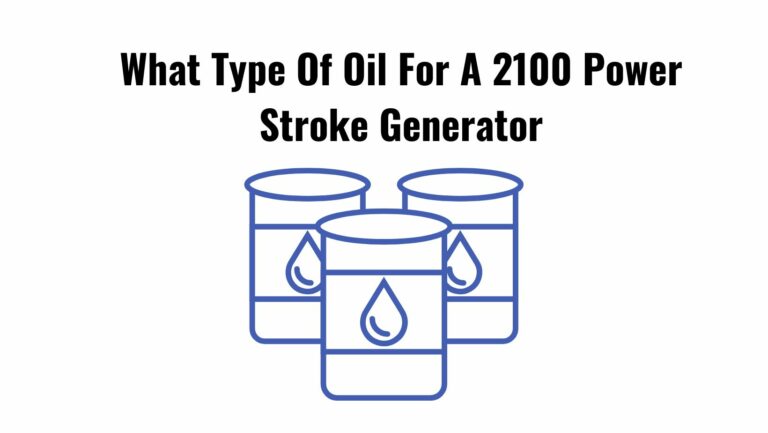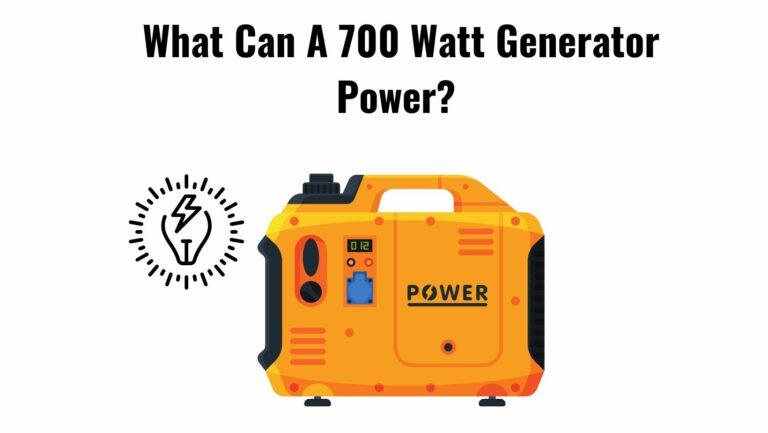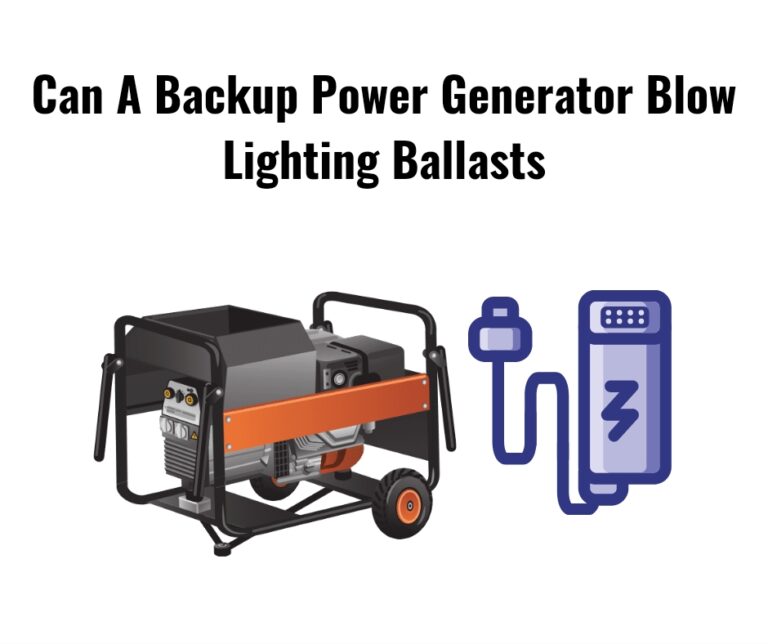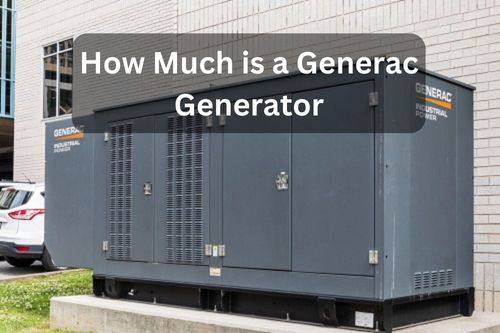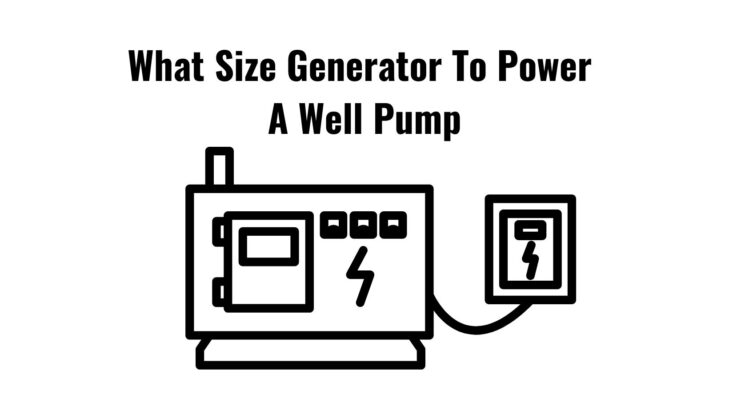
A well pump is an essential component of a household or agricultural well system, responsible for delivering water from the well to the point of use. Whether you live in a rural area or in the suburbs, a well pump is essential for providing you with a constant supply of water. However, without a proper generator, the well pump may not function during a power outage. This is where a well pump generator comes in.
A well pump generator is critical in ensuring a continuous supply of water during power outages. In rural areas, electricity outages are common, and during these times, the well pump may not work. A generator for the well pump ensures that you have a constant supply of water, even when the power is out. This is particularly important for households with young children, elderly family members, or for agricultural purposes.
In this blog post, we will be discussing the various factors that should be considered when choosing the right size generator for your well pump. We will also provide an overview of the different types of generators available and their pros and cons. Finally, we will provide a list of recommended generators for well pumps, based on their flow rate and horsepower, and compare them based on price, fuel type, noise level, and portability. By the end of this post, you will have a clear understanding of what size generator to power your well pump.
Factors to Consider When Choosing a Generator for Your Well Pump
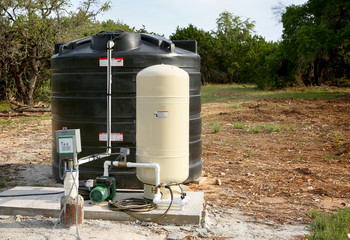
When it comes to powering a well pump, choosing the right generator is crucial to ensuring that your pump operates efficiently and effectively. There are several factors that you need to consider when selecting a generator for your well pump. In this section, we will go over the main factors that you need to consider to make the right choice.
Well Pump Requirements
- Flow rate – The flow rate of your well pump is the amount of water that it pumps in a given time. This is measured in gallons per minute (GPM). It’s important to know the flow rate of your well pump because it will determine the size of the generator that you need.
- Horsepower – The horsepower of your well pump is another important factor to consider. Horsepower is a measure of the power that your pump needs to function. The higher the horsepower of your pump, the more powerful the generator you will need.
- Voltage – The voltage of your well pump is also important to consider. Most well pumps run on either 115 or 230 volts. Knowing the voltage of your pump will help you choose a generator that is compatible with it.
Generator Size
- Wattage – The wattage of a generator is a measure of the amount of power it can generate. The wattage of a generator is important to consider because it determines the amount of power that your well pump can receive.
- Amperage – The amperage of a generator is a measure of the amount of current it can supply. Like wattage, the amperage of a generator is important to consider because it determines the amount of power that your well pump can receive.
- Voltage – The voltage of a generator is another important factor to consider. It needs to match the voltage of your well pump so that the generator can power it effectively.
Other Factors
Location of the generator – The location of your generator is important to consider because it will affect how easily you can access it and how much noise it generates. Consider where you want to place the generator, whether it will be outside or inside, and how close it will be to your well pump.
- Fuel type – There are different types of fuel that can be used to power a generator, including gasoline, propane, and diesel. Consider the availability and cost of the fuel that you prefer and make sure that the generator you choose can run on the fuel you want to use.
- Noise level – The noise level of a generator is another important factor to consider. If the generator is going to be located close to your home, it’s important to choose a generator that is as quiet as possible.
- Price – Finally, consider the cost of the generator you want to purchase. Generators can range in price from a few hundred dollars to several thousand dollars, depending on their size and features. Make sure to choose a generator that fits within your budget, but also provides the power you need to run your well pump effectively.
However, when choosing a generator for your well pump, consider the well pump requirements, generator size, and other factors such as location, fuel type, noise level, and price. By considering these factors, you can select a generator that will power your well pump effectively and efficiently.
Types of Generators for Well Pumps
When it comes to choosing a generator for your well pump, it’s important to understand the different types available and their pros and cons. There are three main types of generators that you can choose from: portable generators, standby generators, and inverter generators. Let’s take a closer look at each type.
Portable Generators
Portable generators are a popular option for powering well pumps because they are affordable, easy to transport, and can be used in a variety of situations. These generators are powered by gasoline, propane, or diesel, and are great for use on construction sites, outdoor events, and for emergency power during outages. The main advantage of portable generators is their mobility, which makes them a good option for those who need a generator for temporary use or for those who need to move it from one location to another.
Pros:
- Affordable
- Easy to transport
- Versatile
- Can be used in a variety of situations
Cons:
- Limited power capacity
- Noisy operation
- Fuel consumption
- Need regular maintenance
Standby Generators
Standby generators are designed to be a permanent solution for those who need a reliable source of power for their well pump. These generators are typically larger and more expensive than portable generators, but they offer a number of advantages. Standby generators are connected to your home’s electrical system and can automatically turn on in the event of a power outage. They are powered by natural gas or propane, which means they can run for long periods without refueling.
Pros:
- Reliable
- Automatically turns on in the event of a power outage
- Can run for long periods without refueling
- Connected to your home’s electrical system
Cons:
- More expensive than portable generators
- Installation can be complicated and expensive
- Requires a permanent location
- May require a permit to install
Inverter Generators
Inverter generators are a newer type of generator that are gaining popularity. These generators are designed to provide clean, stable power that is ideal for sensitive electronics like computers and televisions. Inverter generators are also quieter and more fuel-efficient than traditional portable generators.
Pros:
- Clean and stable power
- Ideal for sensitive electronics
- Quieter operation
- Fuel efficient
Cons:
- More expensive than traditional portable generators
- Limited power capacity
- May not be suitable for larger loads
Moreover, the type of generator you choose for your well pump will depend on your specific needs and budget. Portable generators are a good option for those who need a generator for temporary use or for those who need to move it from one location to another.
Standby generators are designed to be a permanent solution for those who need a reliable source of power for their well pump. Inverter generators are a newer type of generator that provide clean, stable power that is ideal for sensitive electronics. Consider your specific needs and budget when choosing the right type of generator for your well pump.
How to Calculate the Right Size Generator for Your Well Pump
Choosing the right generator size is important for powering your well pump. A generator that is too small won’t have enough power to operate the pump, while a generator that is too large will waste fuel and money. In this section, we’ll walk you through the steps to determine the right size generator for your well pump.
Wattage Calculation
The first step in calculating the right size generator is to determine the wattage requirements of your well pump. You can find this information in the well pump’s manual or on the manufacturer’s website. Most well pumps will have a label or specification sheet that states the maximum and starting wattage.
Finding the Generator’s Maximum and Starting Wattage
The maximum wattage is the highest amount of power the generator can produce at any given time. The starting wattage, on the other hand, is the amount of power needed to start the well pump. Starting wattage is usually higher than the maximum wattage and can be 2-3 times the maximum wattage.
Understanding the Difference Between Maximum and Starting Wattage
It’s important to understand the difference between maximum and starting wattage because you’ll need to make sure the generator you choose can handle both. If the generator can only handle the maximum wattage, it may not be powerful enough to start the well pump. On the other hand, if the generator is only powerful enough to handle the starting wattage, it may not be able to keep up with the well pump’s power needs once it’s running.
Calculating the Total Wattage Needed
Now that you know the well pump’s maximum and starting wattage, you can calculate the total wattage needed by adding the maximum and starting wattage together. This will give you the total amount of power the generator needs to provide in order to run the well pump effectively.
For example, if the well pump has a maximum wattage of 1000 watts and a starting wattage of 2000 watts, the total wattage needed would be 3000 watts. This means you’ll need to find a generator that can handle at least 3000 watts in order to power your well pump effectively.
However, calculating the right size generator for your well pump is an important step in ensuring that your well pump operates effectively. By following these steps, you can find the right size generator to meet your needs.
Final thoughts on Choosing the Right Size Generator for Your Well Pump
Finding the right size generator for your well pump is essential for ensuring that your well pump operates effectively. There are several factors to consider, including the well pump’s flow rate, horsepower, and voltage requirements, as well as the generator’s wattage, amperage, voltage, fuel type, noise level, and price. In this blog post, we have discussed the different types of generators and provided a step-by-step guide on how to calculate the right size generator for your well pump.
Based on the information covered, our final recommendations for choosing the right size generator for your well pump are: make sure the generator can handle both the well pump’s maximum and starting wattage, choose a generator that provides enough wattage to meet the well pump’s power needs, consider the fuel type, noise level, and portability when choosing a generator, and consider purchasing a generator that is powerful enough to handle any future upgrades or expansions to your well pump system. By following these recommendations, you can ensure that you choose the right size generator for your well pump and keep your well pump operating effectively.

